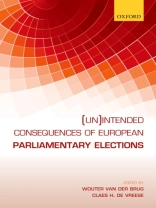When direct elections for the European Parliament were first organized in 1979, the idea was that such direct elections would increase the democratic legitimacy and accountability of the Parliament. Moreover, the elections were expected to raise public interest, engagement and support for the European project. Did these elections help to increase legitimacy and accountability? Did they increase interest in and support for the ‘European project’? Or, did theseelections have unintended (and perhaps undesirable) consequences? This volume focuses on the consequences of European elections for public debate and involvement, for party systems, and for public opinion. EP elections have caused a number of intended consequences: the salience of the elections in the media has gone up and over time electoral competition becomes more important, engaging in the campaign can help improve EU evaluations, and Europe as a topic has become more important for voting at EP elections, boosting the prevalence of so-called EU voting. A number of intended consequences have not materialized during the life of the EP so far: knowledge or turnout levels have not gone up andcitizens have not become better at judging what political parties are offering. The EP elections have, however, also yielded a number of unintended consequences: EP elections dampen turnout for first time voters in subsequent elections, EP elections cause temporary decline in EU support, and theelections have become a strategic arena for political parties to position themselves on EU issues and for new movements and parties to boost or sustain their success.
Wouter van der Brug & Claes H. de Vreese
(Un)intended Consequences of EU Parliamentary Elections [PDF ebook]
(Un)intended Consequences of EU Parliamentary Elections [PDF ebook]
购买此电子书可免费获赠一本!
语言 英语 ● 格式 PDF ● 网页 320 ● ISBN 9780191074721 ● 编辑 Wouter van der Brug & Claes H. de Vreese ● 出版者 OUP Oxford ● 发布时间 2016 ● 下载 3 时 ● 货币 EUR ● ID 4820485 ● 复制保护 Adobe DRM
需要具备DRM功能的电子书阅读器












